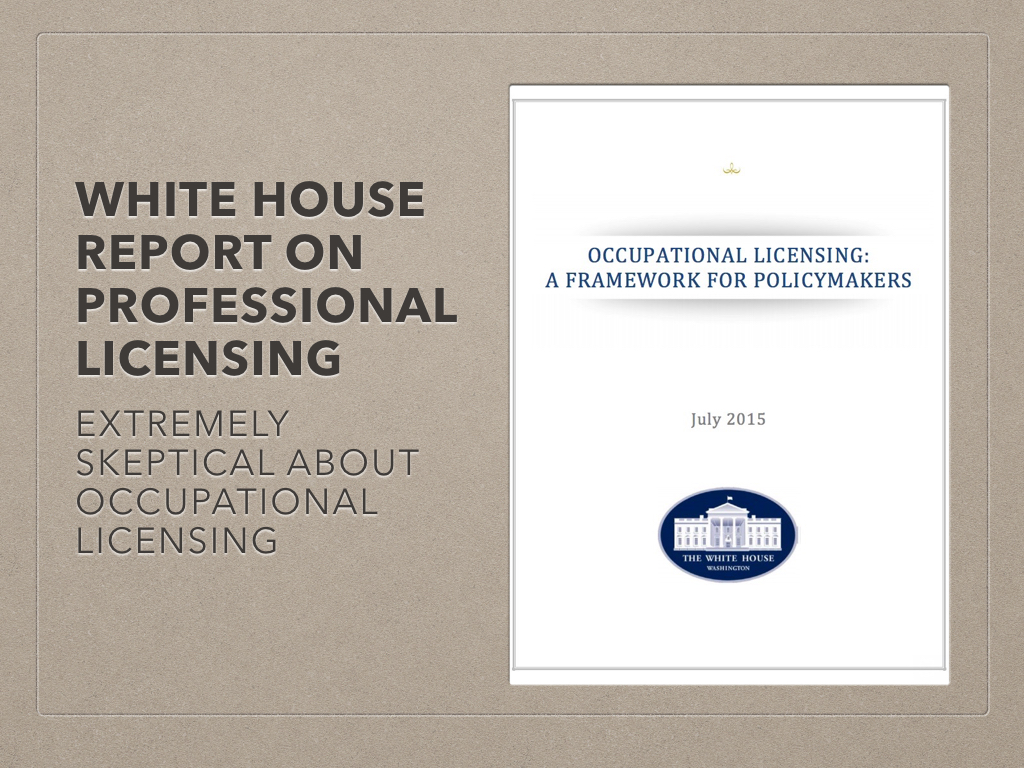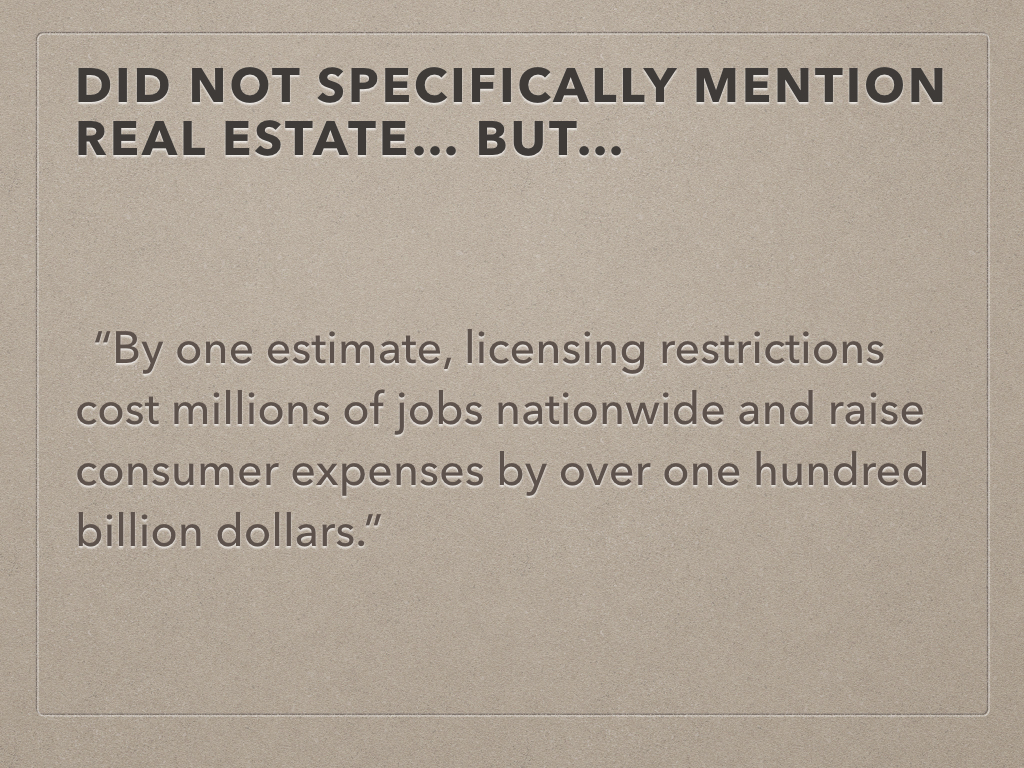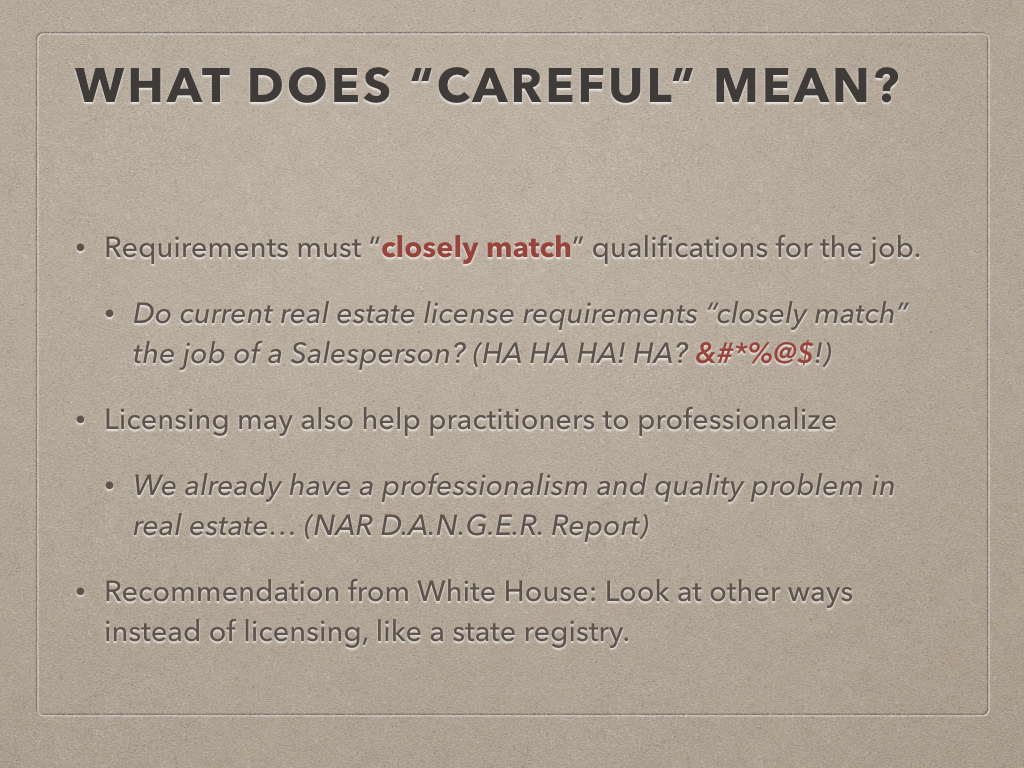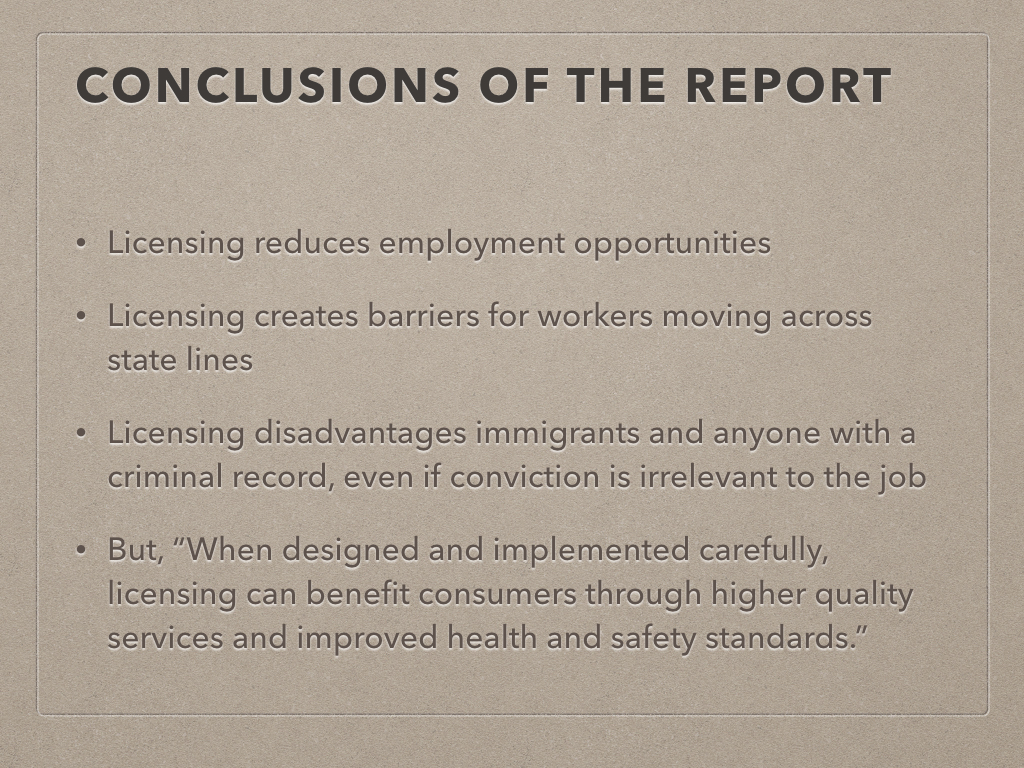I hope everyone had a wonderful Thanksgiving holiday; I personally got some really great news the day before Thanksgiving, so I had a truly memorable one myself. I even managed to hold on to that feeling of profound gratitude as the sentiment turned from giving thanks to indulging in exercises in gluttony that would have put the ancient Roman emperors to shame.
In any event, let us return to crying out in the wilderness for a post. In my previous post about what can be done about marginal agents, I intentionally left out any suggestions, because I wanted to see what the best-informed readership in real estate would say. And many of you said a lot. Some of it was frankly disappointing, but others were awesome.
However, the general theme of the responses came in two flavors. One, there was the age-old agitation about licensing. Two, there was the age-old agitation about broker responsibility. To be sure, there was grumbling about the Association’s effort (or lack thereof) in this arena, but no one really had any suggestions about that.
In this post, I’d like to offer five suggestions, none of which are likely to pass any vote of an Association’s Board of Directors, because they are “unrealistic”. I put that in quotes because I’ve been consulting in this space for years now and have a pretty good idea of the gap between words and actions when it comes to Associations of REALTORS. Like my father, a Methodist minister, used to say, “All minister’s lips go to heaven; the rest of their body is a different story.” So why do it, if it’s unrealistic? Well, to spur on discussion of course, and at least lay down some markers for what we could do if we actually wanted to do anything at all.
First, An Aside on Licensing
Before we dive in, however, let me take a moment to kill off the typical “higher barrier to entry” suggestion: higher requirements for a real estate license.
First of all, there is no question that the barrier to entry that is the real estate license is hardly a barrier; it’s barely a speed bump. As one REALTOR, Melissa Savenko, a reader of this blog put it in a recent post:
What do I mean by higher barriers to entry into the profession? I think it’s a bit shocking that real estate agents are only required to have a high school education or equivalent, to take sixty (60) hours of professional training, to pass a multiple choice test – to which you are given the answers, mind you! – at the end of that training, and to then take a multiple choice professional licensing exam. The requirements for a cosmetologist in the Commonwealth of Virginia: 1,500 hours of training OR a diploma or certificate from an approved training program PLUS six (6) months of training. That is not a typo. See 18 VAC 41-20-20.
However, that will never change. I know you’re never supposed to say never, but I’ll make an exception in this case. It will NEVER change. Why not?
- Real estate licensing is a revenue generator for state governments. Making it harder to get a license naturally reduces demand (the whole point), which then reduces the fees that licensing takes in for the state.
- Regulating real estate licensees means jobs for government employees. More licensees = more work = more AFSCME members with well-paying jobs.
- State legislators think of real estate as a “transitional job” — something that people do in-between their real jobs — and without that transitional job, there would be more unemployment. Not a single legislator of any party anywhere in the country wants unemployment numbers to go up during his/her tenure. And the State doesn’t want to shell out unemployment benefits if it can possibly avoid it.
That last point about “transitional jobs” isn’t something I made up. It’s something that Joel Singer, CEO of the California Association of REALTORS, told me explaining why, despite years of effort on the part of CAR and consumer groups, California hasn’t done much on the licensing requirements front.
Second, even if some States have or are considering the move to higher licensing requirements, the thinking amongst the Elites is in the opposite direction. Exhibit #1 in that is the July 2015 White House Report entitled “Occupational Licensing: A Framework for Policymakers“. I speak about this Report in some of my presentations, so I’ll just give you the relevant slides here.
So… if you’re hoping for the GOVERNMENT to take action to ensure that real estate agents are more professional… well… I have some fantastic investment properties in West Zimbabwe I’d like to talk to you about. If anything, we need to be expecting that licensing requirements will be lowered or eliminated entirely.
With that out of the way, the whole point of which was to suggest that looking to the government is tantamount to doing nothing, let’s turn to what we can control (if we wanted to).
#1: Replace the Code of Ethics with the Code of Professionalism
One concrete action that the Associations can take is to replace the Code of Ethics with the Code of Professionalism. Fact of the matter is, the Code of Ethics has been extremely successful. In fact, it’s become so successful that most of the real “ethical” clauses that protect consumers have been incorporated into laws and regulations. For example, agency law makes real estate agents fiduciaries of the consumer, except in certain limited cases (like “transaction agency” in Florida); REALTORS are no longer unique in that respect. The Code of Ethics was groundbreaking in its day, when typical real estate agents, none of whom were licensed, behaved with the ethical standards of Nigerian pirates, Mexican narcotrafficantes, or the Wolf of Wall Street. Today, with the layers and layers of laws and government regulations that protect consumers, the Code of Ethics really regulates the relationship between professionals, between REALTORS.
So keep calling it the Code of Ethics if you want, but the substance of the Code really needs to be replaced with the standards of Professionalism that we all spend so much time talking about.
NAR can easily convene a Workgroup tasked with coming up with the Code of Professionalism, then make it mandatory. Not some aspirational bullshit like the Code of Excellence, but a mandatory, required, “thou shalt not” for anyone who becomes a member of the Association.
And until NAR does something like that at the national level, at the very least, each State and Local Association can create their own versions of the Code of Professionalism that stands side-by-side with the Code of Ethics. Since each local Association is a membership organization, let the members of that local market decide what Professionalism requires.
#2: Lean Away — Make Changes That Encourage Conviction
The second change that the Association can make is to change its overall philosophy from making it more difficult to be found in violation of a Code provision (whether Code of Ethics or Code of Professionalism) to making it easier. I call this “leaning away” rather than “leaning towards” membership. Let me give you a few examples.
The existing process for enforcement of Code violations “leans towards” membership. The process starts when someone files an Ethics Complaint. However, the burden of making allegations and producing evidence belongs to the complainant. From NAR’s Statement of Professional Standards Policy Applicable to Ethics Proceedings:
In any ethics hearing or other hearing convened to consider alleged violations of membership duties and in any arbitration hearing, the ultimate burden of proving that the Code of Ethics or other membership duty has been violated, or that an arbitration award should be issued to the requesting party, is at all times on complainants and parties requesting arbitration.
Furthermore, NAR requires that evidence meet a standard of proof somewhere between “more likely than not” and “beyond reasonable doubt”:
“Clear, strong, and convincing” shall be the standard of proof by which alleged violations of all membership duties, including violations of the Code of Ethics, are determined.
The hearing itself is conducted before the Professional Standards Committee, and the proceedings, the allegations, the evidence, etc. are all held confidential. Attendance is limited only to the parties involved, plus the adjudicators.
We can of course go on and on by combing through the Code of Ethics and Arbitration Manual, but the general point is that the Association can make changes that alter the balance by making it easier, not more difficult. For example, the burden of proof can be shifted to the defendant to show that s/he did not violate. Or, the standard of proof can be changed to “preponderance of the evidence” which means it was more likely than not. We can remove the confidentiality provision, making it more of an exception rather than the rule: if someone is alleged to have violated the Code of Ethics (or Professionalism), that is a matter of concern to the entire membership, or even the public at large for whom trustworthiness is so important in a real estate professional. Just like our courts are open to the public, unless there is some compelling reason for secrecy, Ethics hearings could be open to all, unless there is a compelling reason for confidentiality.
Whenever the choice is between making it harder to find someone in violation vs. making it easier, go with the easier.
#3: Actively Enforce the Code: Law & Order, REALTOR-style
In 2014, NAR passed a policy requiring that each local Association provide for an ombudsman:
Professional Standards Policy Statement #59, Associations to Provide Ombudsman Services, in the current NAR Code of Ethics and Arbitration Manual, provides as follows:
Every local and state association of REALTORS® is required to offer, either directly or as part of a cooperative enforcement agreement (consistent with Professional Standards Statement #40, Cooperative Enforcement Agreements), ombudsman services to members, clients, and consumers on or before January 1, 2016.
An ombudsman is an individual appointed to receive and resolve disputes through constructive communication and advocating for consensus and understanding.
But as the program makes clear, the ombudsman’s job is not adjudication:
The ombudsman’s role is primarily one of communication and conciliation, not adjudication. Ombudsmen do not determine whether ethics violations have occurred, rather they anticipate, identify, and resolve misunderstandings and disagreements before matters ripen into disputes and possible charges of unethical conduct.
That sounds like a fine program, actually, but… if each local Association can be required to provide an Ombudsman, it can also be required to provide a Compliance Officer.
Think about this: Every MLS does compliance, whether through paid staff or through volunteer committees. In fact, the whole reason why the MLS exists at all is to do cooperation & compensation and compliance. And compliance can and often is proactive — no one needs to make a complaint, detailing the violations. The MLS itself goes out and finds the violations, then addresses them.

I imagine this new Association Compliance Officer to be Law & Order in one position: the police who investigates the crime, and the attorneys who prosecute them. Even in the absence of any complaints, the ACO could be out there looking for violations. If one is found, then the ACO (rather than an individual complainant) compiles the evidence, charges the violation, argues for conviction, and ultimately convicts the violator before the Professional Standards Committee. Simply by moving the burden of investigation, evidence collection, and prosecution to a Compliance Officer makes it easier to find and root out the violators.
One important thing to note here. If you look at the different ways that the MLS handles violations vs. the way that the Association does, it appears as if the MLS follows the “criminal” mode in which the offense is against the MLS itself, whereas the Association follows the “civil” mode in which the offense is between two private parties. My suggestion, then, which is in line with the “lean away” advice above, is that the Association consider any violation of its Code to be an offense against the Association itself and all that it stands for.
[If it’s really important, then the Association can setup a “civil dispute resolution” branch to help members work out their disputes against each other, and separate those from the Code violations that are offenses against the Association and its principles.]
#4: Hold the Broker Responsible, For Everything
Today, the Principal (i.e., the Broker) is not brought into the ethics hearing, but may be brought in:
11. REALTOR® principal may be joined in any complaint filed against a REALTOR® nonprincipal or REALTOR-ASSOCIATE® licensed with the REALTOR® principal or his firm
- The REALTOR® principal with whom a REALTOR® nonprincipal or REALTOR-ASSOCIATE® is affiliated shall not be automatically joined in any ethics complaint against the REALTOR® nonprincipal or REALTOR-ASSOCIATE®. (Revised 4/95) However, the REALTOR® principal may be joined as a respondent in the complaint by action of the complainant, by review of the Grievance Committee, or by determination of the Hearing Panel prior to the commencement of the hearing based on the facts of the complaint. If, however, the complaint is amended after the hearing has commenced, pursuant to Section 21(f)(2), the REALTOR® principal who has been added to the complaint has the right to have the hearing reheard from the beginning by the same Hearing Panel or may waive this right.
- The REALTOR® principal joined in such complaint shall not be automatically found in violation of the Code of Ethics if the REALTOR® nonprincipal or REALTOR-ASSOCIATE® is judged in violation, but the finding should be based on the facts and merits of the case.
- Discipline of the REALTOR® principal, if any, may vary from that imposed upon the REALTOR® nonprincipal or REALTOR-ASSOCIATE®.
How about we go in the opposite direction here and make the REALTOR principal (that is, the broker) be the subject of every single ethics complaint against any of his/her affiliated agents, and leave the actual individual agent out of it? If the brokerage is in theory, and under the real estate license laws of all 50 states, charged with providing guidance and oversight to salespersons under his supervision, then there is no reason for the Association not to hold the broker responsible for violations.
If what we want, as many of my commenters in the previous post seemed to suggest, is to change the behavior of brokerages, then we have to create incentives for the brokerages to change. The Association can make that happen by making the broker responsible for every single ethics violation, and publishing the names not of the individual REALTOR member/agent, but of the Broker and the Firm that houses, tolerates, and fails to manage/train the ethics violators.
#5: Publicize the Violators
Speaking of publishing names… that is one easy change to make. Today, even if a REALTOR is found to have been in violation of a Code provision, publicizing that fact is very, very difficult indeed:
45. Publishing the names of Code of Ethics violators
Boards and Associations may, as a matter of local discretion, adopt procedures authorizing the publication of the names of ethics violators, subject to the following qualifications:
- Publication can only occur after a second violation occurs within three (3) years.
- Publication can only be made in an official communication vehicle intended primarily for members of the Board (or Boards) in which the violator holds (held) membership. Where the official communication vehicle is electronic or Internet-based, access must be limited to Board members. (Amended 11/04)
- The name of the firm the violator is (or was) licensed with cannot be published.
- Publication must be consistent and uniform. This means that publication may not occur selectively but must be used in each instance where a second violation is determined within three (3) years.
- Other than the violator’s name, the only additional information that may be published is the Article (or Articles) violated, and the discipline imposed, except that in cases where the violator’s name is similar to another member’s name, the violator’s license number or office address (or both) may also be published. (Amended 11/99)
Why make it so difficult? How about we “lean away” and make it easier than ever for violators to be put on the Wall of Shame? What if the local Association puts up a public-facing website allowing consumers to go search each REALTOR by name to look up their violations over the past ten years?
We’re not talking about innocent people here; we’re talking about folks who were actually found to have violated one or more provisions of the Code of Ethics. If you think that’s harsh punishment for some of the Code provisions, then the problem is the Code provision in the first place. A provision that I can violate willy-nilly and not worry about damage to my reputation is a provision that probably shouldn’t be in the Code of Ethics in the first place. It’s ticky-tack, inside-baseball, REALTOR-to-REALTOR bullshit that frankly is the kind of “civil” disagreement that affects the consumer not at all.
But if we’re talking about Code violations that affect the public, that affects the buyers and sellers, then hell, even a single violation should be put up on a website and broadcast for everyone to see, along with the penalties that the Association imposed.
For example, suppose a REALTOR has violated SoP 1-3, which reads, “REALTORS®, in attempting to secure a listing, shall not deliberately mislead the owner as to market value.” Let’s say that this REALTOR literally fakes a CMA, using fake data, to get a listing, thinking that he can get the client to reduce prices later. It’s found out, and that REALTOR is punished.
Is there any reason whatsoever that his name, his Firm’s name, his Broker’s name, and the punishment doled out by the Association not be made public to all buyers and sellers in that market? Not to me, and not if the Association is serious about professionalism and ethical conduct.
Conclusion
This got long. Frankly, I could go on for a while more, but… 3,000 words already of just a voice crying out in the wilderness…. As I said at the start, I can’t see even one of these five changes passing any Association’s Board of Directors today. If you disagree, and think that your Board would be willing, would have the political will to do any of these, please let me know, because I’d like to talk to your Board and see if there’s anything I can do to help.
But that’s today. Who knows where we’ll be tomorrow? Who knows what changes might come overnight, or over the next year, or over the next ten years? Who knows if the young turks of the YPN today will become middle-aged Presidents of NAR with wholly different ideas and philosophies that make these realistic one day?
Hope springs eternal, after all! One of these days… one day….







10 thoughts on “Marginal REALTORS: Five Things an Association Can Do Today”
I am vice chair on Pro Standards for my local Board–you make a lot of good points, but bringing the Managing Broker up for ethics violations of the agent is not a good idea. You should always run an ethical office, and the Broker should regularly train on the Code of Ethics. However, punishing the Broker for what his agents have done, is going in the wrong direction unless the Broker ‘advised” the agent to do something unethical. It would be like suing the gunmaker for every crime the user of the gun committed. The user should know the rules and if he is not compliant, the user will lose the priviledges, not the manufacturer.
I think his point was that brokers would be less likely to hire or continue to house unethical agents if there were consequences for the broker. The fact that many brokers can and do turn a blind eye to their less than ethical agents who may be profitable to the brokerage is bad for the industry.
I do agree that they can’t monitor every agent’s actions at all times, but there could be a 3 strikes-like provision that would levy increasingly severe punishment for brokers that repeatedly house agents who violate the code of ethics.
As Brian said, my view has evolved on this. Of course it’s unfair to punish the Broker for something his agent has done, unless the Broker was also involved somehow. But this isn’t about punishing; it’s about creating incentives (and disincentives) for certain behavior.
If a Broker knew ahead of time that any Ethics violation isn’t going to be on Suzie Agent, but on his name, his record, his firm’s name, he’s far more incentivized to take greater care on recruiting, mandatory training, and the like. I get the whole “independent contractor” fiction that the industry’s bought into because of tax reasons, but as an Association, the members can keep it real between themselves. We know that if Brokers got real serious about rooting out unethical and unprofessional behavior, it’d get done.
I want the Association to create incentives to encourage Brokers to get real serious.
The incompetent agents will fail , the market will take care of them,the dishonest will be removed by the legal system, but there is something wrong in enforcing a a code of ethics,when the enforcement is applied to unwilling “members” the entire “membership” of nar is coerced,there are NO voluntary members,perhaps we should start there,the ONLY reason any RE Agent is associated with nar, state,local boards and the mls’s, is to obtain the key,access to the listings,this method of doing business used to be called something else,that should be fixed first,the DOJ, perhaps?
I’m trying to reach back and grasp why marginal real estate agents need to be dealt with by boards? I mean, I understand why Zillow would wouldn’t want to sell leads to marginal real estate agents. I also understand why reputable brokers would address marginal agents because we don’t want our inventory sitting on the market not selling.
Buy why do boards need to deal with marginal real estate agents? I mean, there are marginal doctors, lawyers, engineers, etc. As a matter of fact every trade has marginal participants. Hasn’t capitalism already been hard at work weeding marginal-ism?
Two reasons.
#1: The Boards are ostensibly non-profits whose core mission statement is professionalism. The Preamble to the Code of Ethics, the “Constitution” of the Boards, says:
“Such interests impose obligations beyond those of ordinary commerce. They impose grave social responsibility and a patriotic duty to which REALTORS® should dedicate themselves, and for which they should be diligent in preparing themselves. REALTORS®, therefore, are zealous to maintain and improve the standards of their calling and share with their fellow REALTORS® a common responsibility for its integrity and honor.”
Alternatively, NAR could change that language to something more like:
“Such interests impose obligations to grow the Association ranks. They impose grave social responsibility to give out awards congratulating ourselves, and a patriotic duty to have extravagant installation dinner parties to which REALTORS® should dedicate themselves, and for which they should be diligent in preparing themselves. REALTORS®, therefore, are zealous to maintain the numbers of dues-paying members and improve the standards of the venues of the conferences and parties at which they can get together with their fellow REALTORS® to elect each other to various offices.”
And then let capitalism weed out the marginal agents.
#2: BOARDS! Huh! What is it good for?
If the Boards/Association do not focus on professionalism, then what is it good for? I’ve often heard people say that if Zillow went bankrupt tomorrow, houses would still get sold, and business would still get done. The same could be said for REALTOR Associations. Their existence or nonexistence wouldn’t affect the number of homes sold or apartments rented by even one.
If the Association won’t live up to its core mission of creating and enforcing Professionalism, then it’s just extracting money out of the wallets of working brokers and agents everywhere and needs to be eliminated entirely.
I think you have some excellent points. Though, much like any other trade organizations, when it comes to policing ourselves, I believe you are doomed to fight a forever uphill battle.
QUALIFICATIONS: Broker/Owner, President of MLS, Ombudsman, Pro-standards hearing officer.
I agree with everything. YES, the MLS has automatic fines and rules. Staff can call out violators. The largest problem with I see with having an association compliance officer is proof. MLS violations are usually concrete (write up, photos, home access without permission, etc.). Ethics violations usually have less hard evidence, more he said/she said and supposition. A violation would still need to be reported and investigating could be pretty difficult.
Broker responsibility? ABSOLUTELY! The state laws charge me with this, and I can even be fined for “Failure to supervise”. At a minimum the broker should ALWAYS appear with any agent charged.
Finally – Publicizing Violators. I’m cool with that, but I don’t know if the public would pay much attention – unless we educate the public to visit a BBB type place to check for violators (not very likely I think). Otherwise, only other REALTORS will know about the violations. Not sure how much good this will do, we mostly already know who the bad guys are.
To VARealEstateBroker – I see a lot of incompetence in the market place. I see lots of dishonesty. Yes, eventually the law catches up to some, not all. Our state has very limited resources to investigate. Some can take 2-3 years to finalize. During that time the public is still at risk. As for incompetency, the public doesn’t know what it doesn’t know. Liking your agent is more important that how good of a job they do. Especially for the most at risk clients – first time buyers and those in high stress selling positions. It is nice to think the free market would take care of this, but so far I think it has failed.
Thanks Greg – a couple of responses:
1. “The largest problem with I see with having an association compliance officer is proof. MLS violations are usually concrete (write up, photos, home access without permission, etc.). Ethics violations usually have less hard evidence, more he said/she said and supposition. A violation would still need to be reported and investigating could be pretty difficult.”
True — but that’s why I think an Association Compliance Officer would be good. Since proof is less hard evidence, having someone whose job is to find and compile that evidence would be helpful. Plus, there’s no reason why a private Association’s Ethics Hearings need to have some super-high standard of proof. There’s not even a requirement that someone be “innocent until proven guilty”; you can just make it whatever you want it to be. 🙂
2. As for publicizing violators, “we” mostly already know who the bad guys are. So let’s let the public know. Creating a BBB type place is precisely what I have in mind. I can’t think of a reason why this isn’t already being done.
Comments are closed.